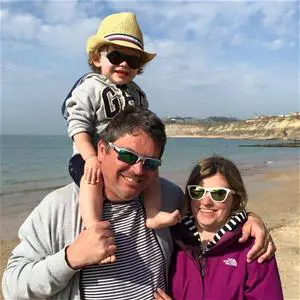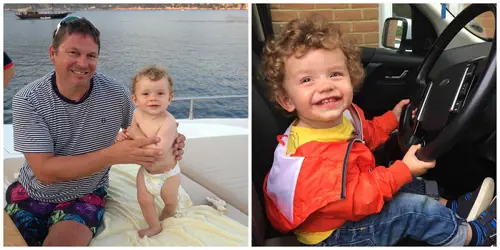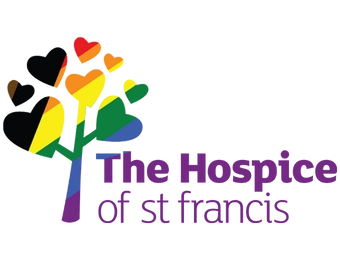Philip and Jemma Crane were just five years into their marriage, enjoying family life with their two-year-old son Charlie, when out of the blue, Philip, 49, was diagnosed with terminal cancer.
Over a year on from Philip’s death, Jemma, 37, says their experience of The Hospice of St Francis has changed their perceptions of what a hospice does…
It was in November 2015 that Philip complained of feeling run down but he just put it down to a long stint running up to Christmas with no time off. For a couple of months he’d had a niggling bad back too, but he thought it was because he’d been carrying our chunky two-year-old, Charlie, around on his shoulders.
I finally got him to make a doctor’s appointment and the day before he went I remember vividly him carrying some shirts up the stairs and getting really puffed out. Rather unsympathetically, I said, “Are you serious?” “Yes,” he said, “I am.”
The next day, we saw our GP who took one look at him and diagnosed a stomach ulcer caused by the Ibuprofen he’d been taking for his back. He took some bloods and off we went home.
We’d just had dinner when the phone rang. It was an out of hours GP telling Philip to go straight to A&E. His haemoglobin levels were really low and he needed a blood transfusion.

He was in Watford Hospital the whole weekend having the transfusion, a CT scan and various tests. As soon as I got there after work on the Monday and found him sitting on the bed fully clothed, I just knew that something was up.
“They think it’s malignant,” he said. He didn’t use the word ‘cancer’ but his mum and dad had been there when he was given the news and they asked the MacMillan nurses if it was treatable. “Yes,” they said, but back home, I read his letter of discharge, which made several references to metastatic cancer. I knew it was serious.
A week later, we went back for the full histology. “It’s terminal,” they said. The primary stage 4 cancer was in his stomach but it had spread to his liver, lungs and bones. They urged him to get his affairs in order and told us he had 12 months to live with treatment – or 2-4 months without.
It was in that same meeting that The Hospice of St Francis was first mentioned. We were told that the Hospice’s community nursing team would contact us the next day. “If some woman’s going to come and sit in my lounge and talk to me about dying, she can go straight back out the door,” Philip said. That was his perception of hospices - we were both quite apprehensive.
However when Fay, the Community Nurse Specialist team lead, arrived, she was lovely. She talked us through practical things that hadn’t entered our heads. Did Philip have enough of his prescription medication? Was he in any pain? Did he know how to access Personal Independence Plans? Did we need a blue badge for our car and was there any specialist equipment we needed at home to make things easier?
Fay became our one constant point of contact and our relationship with her grew from there.
In early January, Philip became quite unwell, so much so that he couldn’t get out of bed. He really needed to be in a specialist cancer hospital. He was admitted to Mount Vernon with an infection needing antibiotics, and between January and March he was in and out of hospital having blood transfusions - at one point every week - as well as chemo and quite high doses of steroids.
He developed lymphoedema in his legs and had to use a walking stick and a frame to get around but all the time we just kept hoping that the chemo would work and the steroids could be reduced.
We were always looking to how things would improve and Philip was adamant he was going to live beyond 12 months.
Towards the end of February, Philip came to the Hospice as an outpatient for a full drug review with Dr. Neil Pender, a Consultant in Palliative Medicine, to suggest ways of getting his pain under control. Dr Neil also recommended radiotherapy in certain areas, which helped too.
But in early March, Philip was admitted as an inpatient so the Hospice team could monitor him properly and get his pain to a manageable level to enable him to come home again. It was too much to be fixed but with different drugs, they significantly reduced it.
It was so much like home - he had his own room, with doors opening into the garden. We could spend all day there and Charlie loved it. He’d take his toy lawn mower and run up and down on the grass. He loved the woodland area, the animal carvings and the pheasants who were frequent visitors. To him it was almost like a day out.

He’d feed the fish, sleep on Philip’s bed during the day, and every evening we’d eat a hot meal together in the dining room, that I’d prepared at home, which meant a lot to us. The hot lunches prepared by the kitchen staff were great and, every day, Philip would send me a photo of his breakfast.
Philip was a huge Spurs fan and one night there was a Tottenham game on telly. They lost but we sat and watched it in the patients’ lounge and had a Chinese take-away and a beer. It was lovely.
After two weeks and with his pain under control, he was well enough to come home and we had the longest period there – 17 days - since his first stay in hospital back in early January. But in the middle of the night on 9th April his tummy started hurting, then it passed, then it just got worse and worse.
He was due to go to Mount Vernon that day for a blood transfusion and he hoped he’d be able to hold out but he was in so much agony that I had to call 999 and he was blue-lighted to Watford General, where we met his mum and dad. We got there at 5am and they said that either he was going to be fine or he wasn’t and we needed to prepare ourselves. The tumour in his stomach had perforated. He died at midday. Even now, it feels surreal. I wonder if it’s really happened and if any minute we’re going to click back to normal. The impact of losing him has been huge - nothing else could have been so life-changing. I started coming to the Hospice for bereavement counselling two months later.
You keep a lid on everything day to day, but once a week the sessions gave me a safe place where I could take that lid off. I wanted to get this right, I don’t want Charlie growing up to be a troubled teenager so for half the session we talked about Charlie and the enormity of being a single parent when this was never the plan. Jo, my bereavement counsellor, advised me to be really honest with him and not to use words or terms which might confuse him like passed away instead of died.
He talks about Philip a lot and he’s very articulate. He says things like “when I grow up I’m going to have big hands like Daddy’s” but he still has his moments. A couple of nights ago when he went to bed, he said, “I feel sad, I miss Daddy.” He’s three and he knows what it feels like to miss someone.
The all-round support we have received as a family from the Hospice has been invaluable. I can honestly say that our experience has totally changed our perceptions of what a hospice does. It’s a really positive place which gave us really valuable time together as a family – time that I will never forget.






Share Article